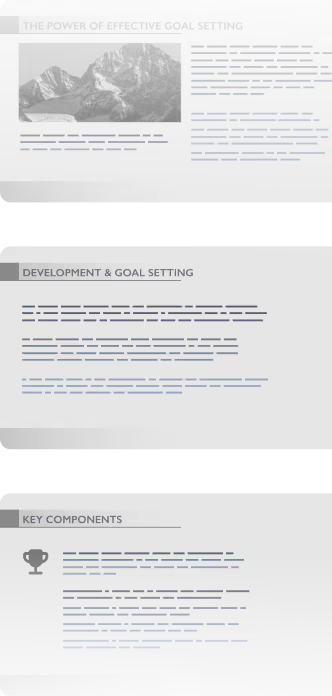The best AI-powered alternative to PowerPoint
Create stunning presentations in seconds with Prezi AI, the AI presentation platform proven to capture attention better than PowerPoint.


How Prezi beats PowerPoint
Presentasi lebih cepat dan lebih baik dengan Prezi
Fitur


Kreasi AI


Animasi


Tingkatkan presentasi yang ada


Adaptabilitas langsung


Kolaborasi


Analitik


Aplikasi seluler


Harga


Sudah menggunakan PowerPoint? Beralih itu mudah. Prezi AI membantu Anda membangun ulang presentasi dalam hitungan detik.
Build smarter. Deliver faster.
Custom presentations made quickly
Mulai dengan Prezi itu mudah. Unggah presentasi yang sudah ada atau cukup ketikkan ide Anda di Prezi AI. Dalam hitungan detik, Anda akan mendapatkan presentasi yang dibuat khusus, visual, terorganisasi, dan siap memukau. Tanpa template dan tanpa konten membosankan.
Effortless creation
Satu klik berarti satu presentasi jadi. Prezi AI memahami apa yang Anda presentasikan dan langsung merancangnya. Habiskan lebih sedikit waktu membangun dan lebih banyak waktu untuk menuntaskan pekerjaan Anda.
Scientifically proven engagement
Prezi bukan hanya soal slide yang indah (kami punya itu juga). Kami berfokus pada hasil. Dalam sebuah studi buta yang dipimpin universitas, Prezi terbukti 25% lebih efektif dan 22% lebih persuasif daripada presentasi statis. Itu berarti orang akan mengingat apa yang Anda katakan, dan bertindak atasnya juga.
Collaborate better. Present smarter.
Real-time collaboration
Kerja tim tidak memperlambat Anda dengan Prezi. Seluruh tim Anda dapat membuat, mengedit, dan meninjau presentasi bersama secara langsung. Tanpa menunggu pembaruan, tanpa kekacauan file.
Perlengkapan merek
Tetap sepenuhnya sesuai merek untuk setiap presentasi. Brand kit Prezi mengunci warna, font, dan logo Anda sehingga setiap presentasi yang Anda buat terlihat konsisten dan profesional, bahkan saat Prezi AI yang membuatnya untuk Anda.
Storytelling in motion
Slide statis membuat audiens mengantuk. Tata letak dinamis kami menarik perhatian mereka dan memungkinkan Anda berpindah antar gagasan secara alami. Soroti apa yang ingin dilihat audiens Anda, tepat saat mereka ingin melihatnya. Buat presentasi yang benar-benar diingat orang.
Mengapa pengguna PowerPoint beralih ke Prezi
Saya sudah menggunakan banyak alat presentasi sebelumnya, tetapi Prezi menonjol sebagai salah satu yang terbaik. Fitur zoom yang unik dan tata letak dinamisnya membuat presentasi saya tampak menarik secara visual dan jauh lebih mudah diingat dibandingkan slide tradisional.
Saya membuat rekan guru saya terkesan ketika saya menunjukkan kepadanya apa yang bisa dilakukan Prezi AI. Cukup masukkan beberapa kata dan itu merancang seluruh PERTUNJUKAN. Lalu saya bisa kembali mengedit dan menambahkan lebih banyak hal. Saya berencana menggunakan ini lebih sering untuk mengajar dengan "pizz zazz"!
Saya beralih dari PowerPoint ke Prezi 10 tahun yang lalu, dan sejak itu tidak pernah menoleh ke belakang! Sebagai seorang guru, Prezi telah menjadi alat yang sangat penting di kelas saya, membuat pelajaran lebih menarik dan interaktif.
Masih pakai PowerPoint? Kamu ketinggalan banyak.
Berhenti membuang waktu pada template dan slide yang membosankan. Prezi AI membuat, merancang, dan membantu Anda mempresentasikan dengan kecepatan serta dampak yang tak tertandingi. Didukung oleh sains dan dipercaya oleh jutaan orang.


Pertanyaan yang sering diajukan
Bisakah saya mengimpor dan mengekspor deck PowerPoint ke Prezi?
Yes! Upload any existing presentation as a PPTX, PDF, or DOCX file and Prezi AI will automatically rebuild your presentation with a fresh, dynamic design. You can export any presentation from Prezi as a PowerPoint file, too.
AI mana yang terbaik untuk presentasi PowerPoint?
Prezi AI is trained on the largest public presentation library available and refined by our team of presentation designers. That means an AI presentation maker that knows how to make great decks, even if you need them as a PowerPoint.
Apakah ada pembuat PowerPoint gratis?
Yes. With Prezi, you can make your presentation with all of our upgrades and then export your work as a PowerPoint file. That means all the benefits of Prezi, converted into the file type you need.
Apakah Prezi lebih baik daripada PowerPoint untuk kelas saya?
Definitely. Educators around the world love Prezi because it does a better job keeping your students interested and makes complex ideas easy to follow. We’ve even got a special plan for educators like you.
Bisakah saya menggunakan Prezi bersama tim saya?
Yes! Prezi is built for collaboration. You and your team can create, edit, and present together in real time from anywhere. It’s easy to add comments, make live updates, and stay in sync without needing to send endless presentation versions to each other.










